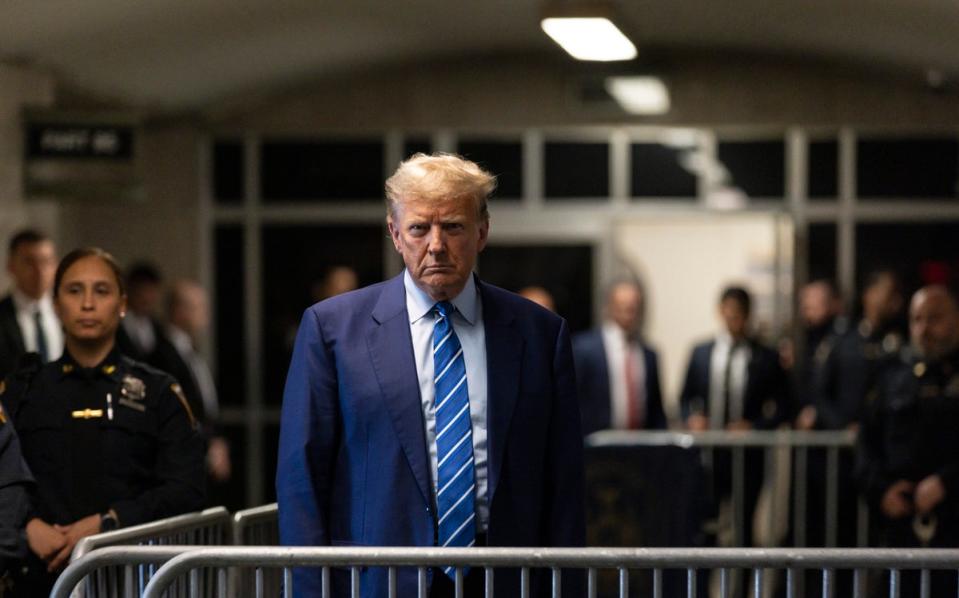Trump claims ‘big win’ after judge rejects ABC News attempt to dismiss defamation suit

Donald Trump will be allowed to sue ABC News and George Stephanopoulos for defamation after a federal judge rejected the network’s attempts to dismiss a lawsuit targeting the anchor’s statements that Trump had been “found liable for rape.”
In March, Stephanopoulos pressed congresswoman Nancy Mace about her support for the former president, despite a judge finding him “liable for rape by a jury.”
“Donald Trump has been found liable for defaming the victim of that rape by a jury. It’s been affirmed by a judge,” he said.
Two separate juries found Trump liable for defaming and sexually abusing E Jean Carroll after he repeatedly called her a liar for speaking publicly about allegations that he assaulted her in the 1990s. Trump has appealed the $83.3m verdict
The judge overseeing those cases wrote last year that Carroll’s failure to “prove that she was ‘raped’ within the meaning of the New York Penal Law does not mean that she failed to prove that Mr Trump ‘raped’ her as many people commonly understand the word ‘rape.’”
“Indeed, as the evidence at trial recounted below makes clear, the jury found that Mr Trump in fact did exactly that,” US District Judge Lewis Kaplan wrote.
But Trump’s lawyers sued the network in federal court in Florida and accused Stephanopoulos of making “patently and demonstrably false” statements about him on air.
On Wednesday, US District Judge Cecilia Altonaga denied the network’s motion to dismiss the case.

“A BIG WIN TODAY IN HIGH FLORIDA COURT AGAINST ABC FAKE NEWS, AND LIDDLE’ GEORGE SLOPADOPOLUS. A POWERFUL CASE!” the Republican presidential nominee wrote on Truth Social.
“BEFORE YOU KNOW IT, THE FAKE NEWS MEDIA WILL BE FORCED BY THE COURTS TO START TELLING THE TRUTH. THIS IS A GREAT DAY FOR OUR COUNTRY. MAGA2024!”
Judge Altonagaa rejected ABC’s arguments surrounding the allegedly defamatory statements had already been settled by the judge in Carroll’s case.
The judge also rejected the network’s arguments that the statements were “substantially” true and thus protected under Florida’s so-called “fair report privilege,” saying she was “not persuaded that such broad latitude exists under Florida law.”
“True, the fair report privilege absolves the media of the burden to be ‘technically precise’ in their descriptions of legal proceedings,” she wrote. “But the privilege does not protect media where the omission of important context renders a report misleading.”
She argued that a “reasonable viewer” who watched the ABC News segment “could have been misled by Stephanopoulos’s statements, which did not include the jury’s original findings and only fleetingly referenced the interpretation Judge Kaplan later offered.”
“Judge Kaplan’s findings do not have preclusive effect here,” she added. “The Court is thus only persuaded that substantial truth would arise if the jury’s verdict of ‘No’ was presented in combination with Judge Kaplan’s additional findings. The Court considers that aspect of Defendants’ arguments now, considering the allegedly defamatory segment in its entirety and in context, from the perspective of a reasonable viewer.”
Under that standard, “a reasonable jury could interpret Stephanopoulos’s statements as defamatory,” she wrote.

A jury may ultimately determine there was “sufficient context” in the ABC News segment, but “a reasonable jury could conclude Plaintiff was defamed and, as a result, dismissal is inappropriate,” according to Judge Altonaga.
The judge’s order marks another legal victory for the former president, after another federal judge dismissed a massive criminal case accusing Trump of illegally hoarding classified documents from law enforcement and then obstructing the government’s attempts to get them back.
He also claimed victory after the Supreme Court determined that presidents have “absolute” immunity from criminal prosecution for “official acts” in office, potentially jeopardizing elements of a separate criminal case involving his attempts to overturn the 2020 presidential election.
A judge in New York, where Trump was convicted of 34 felony counts of falsifying business records, has agreed to review the Supreme Court’s decision as it applies to that case.